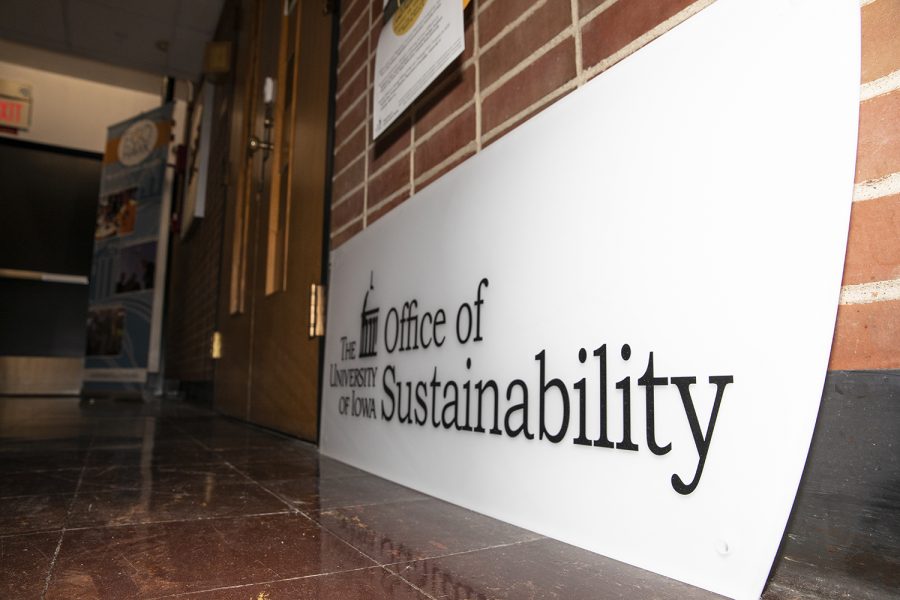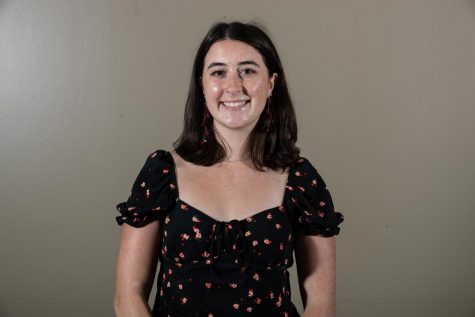UI student intern works towards more sustainable practices at UIHC
UIHC and the UI Office of Sustainability are collaborating on a project to promote sustainability in the hospitals with the help of UI senior Claire Jacobmeyer. The project focuses on enhancing sustainable education and practices.
The University of Iowa Office of Sustainability in the Communication Center on October 21, 2019. The Office of Sustainability is partnering with University Dining to reduce waste at Iowa.
November 11, 2019
With the help of University of Iowa senior Claire Jacobmeyer, the UI Office of Sustainability and University of Iowa Hospitals and Clinics are working together to reduce waste in UIHC and promote sustainable practices.
Data collected by the UI Office of Sustainability show that health-care facilities produce about 29 pounds of waste per patient bed a day globally, making UIHC a key component to improving sustainability across campus.
In her role as the recycling and waste reduction intern, Jacobmeyer is working toward educating staff members about sustainable practices, implementing a more effective infrastructure, and creating a website specifically for hospital staff. Jacobmeyer is the second intern to work on this project, which began in spring 2018.
According to waste audits conducted by the UI Office of Sustainability, there is a 34-percent reduction opportunity within UIHC’s waste stream, Jacobmeyer said. Since hospitals like UIHC are so big and have their own needs, it’s important that staff have access to information on how to be more sustainable both at work and at home, she said.
“Something I learned a lot while speaking with staff is that they really wanted to do the right thing, but they had no guidance,” Jacobmeyer said. “And they really didn’t have anywhere to go to get that information.”
Jacobmeyer said she found the environment project intern for waste reduction position while looking for job opportunities in waste reduction — her area of interest. However, this had not always been her main career path, she said. Jacobmeyer said she previously earned her degree in graphic design but came back to school to pursue environmental policy after realizing her passion for sustainability.
“I don’t know how I got started on it, but I started watching a lot of documentaries, and the one that really stuck with me was Plastic Ocean … and I just got really interested in zero-waste living and decided I cared about that more than anything else,” Jacobmeyer said.
Zero-waste living has become a part of Jacobmeyer’s own life, she said, and so has working in sustainability.
In addition to her internship with the UI, Jacobmeyer is the co-chair for the Cedar-Wapsi Group of the Iowa Sierra Club, where she is in charge of a series of “waste less” workshops in Cedar Rapids.
Within the collaborative project, Jacobmeyer said that the relationship between the UI Office of Sustainability and UIHC is very positive. UIHC has its own University Sustainability Charter Committee, which meets quarterly, but Jacobmeyer said she thinks there can be more progress if the committee were to meet more.
Glen Rogers, a representative for the University Sustainability Charter Committee and director of housekeeping at UIHC, said that having Jacobmeyer work with UIHC has been great because, unlike committee members, she can solely focus on the project’s efforts.
RELATED: University of Iowa alum creates groundbreaking food waste course
“Having Claire here is great,” Rogers said. “Having a dedicated resource is probably the No. 1 thing that helps that she is someone who is focused 100 percent on sustainability.”
Due to the size of the hospital and the existing practices that have been in place for so long, Jacobmeyer said changing the culture around being more sustainable has proven to be challenging.
“I think that there’s this misconception that waste can’t be reduced within health care, because everything relies on single use plastics … but there has been a shift in that mindset very recently,” she said. “There are a lot of hospitals that are starting to get sustainability staff or sustainability coordinators.”
Recycling Coordinator for the UI Office of Sustainability Beth MacKenzie started working for the UI three years ago. She said that, when she started, one of the first things she did was collect waste data across the campus. This data revealed that UIHC was a large contributor to the waste on campus.
Although UIHC was already doing a good job addressing sustainability, MacKenzie said that this internship and project was a matter of formalizing a strategy and being proactive in terms of finding opportunities to reduce waste.
“I think, on campus in general, this kind of project is obviously important to reach our waste goals, but really … I think it’s unique because it is in the health care,” MacKenzie said. “It’s interesting, because we’re finding new ways to advance sustainability in interesting ways.”
In her focus on sustainability in the past, she hadn’t considered hospital waste, Jacobmeyer said, but it has been amazing and humbling to learn about that side of health care.
“I think when you’re when you’re in this kind of position, it’s easy to get overwhelmed with the scale of the issue,” Jacobmeyer said. “But when you’re there, working every day, and you see people doing their best and see progress. It makes me a lot more optimistic about the future.”






















